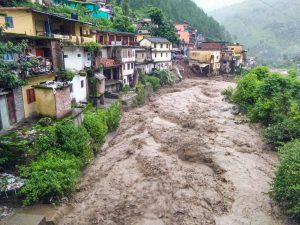CSIR : National Geophysical Research Institute Early Warning System

The National Geophysical Research Institute (NGRI) of the Council of Scientific and Industrial Research has begun field studies to install early warning system against floods, rockslides, and avalanches in Himalayan States.
- The scientists in the institute have identified a few locations in the higher reaches of Uttarakhand for “densification” of seismometers and river gauges to take the total number to 100 from 60.
- The objective is to closely monitor the river flows in specific areas along the catchment to detect any sudden rise in water levels or flooding threshold that can lead to a hazard.
- Scientists have decided to take cognisance of the vibrations or “noise” recorded by the seismometers, which need not be due to earthquakes but can also be because of vehicular traffic, animal movement, rain, river flows and so on.
- These instruments are crucial for the safety of large infrastructure projects and hydroelectric power plants in this region.
- Currently, scientists are able to detect and assess a sudden flow 30-40 km away since the seismic wave is faster than the flow, and hence, the advance warning comes at least half an hour before.
- The NGRI has started utilising Machine Learning to detect these observations faster than the normal approach.
Initiative by Geological Survey of India (GSI): - Scientists at the Geological Survey of India (GSI), a scientific agency established under the Ministry of Mines to conduct geological surveys and studies of India, in collaboration with the British Geological Survey, have been evaluating a prototype to predict landslides in the Darjeeling district of West Bengal and the Nilgiris in Tamil Nadu.
Early warning systems:
- Early warning systems have been recognized as an effective tool to reduce vulnerabilities and improve preparedness and response to hazards, according to the United Nations Development Programme.
- The Sendai Framework for Disaster Risk Reduction (2015–2030), an international document adopted by United Nations (UN) member states in 2015, requires countries to set out an early warning system with a multi-hazard approach by 2030.




